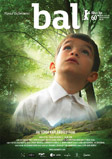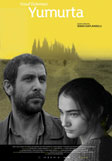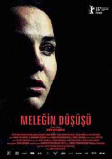March 10, 2011
Bal (Honey), Grade:B
Harvey Karten / Arizona Reporter
The opposite of light is dark and the opposite of hero is coward. But what's the opposite of the movie \”Battle: Los Angeles?\” There are many, but the one that comes to mind right now is \”Bal\” (\”Honey\” is the English translation of the Turkish title.) Where \”Battle\” Los Angeles\” features deafening music on the soundtrack, \”Bal\” has none. Where \”Battle: Los Angeles\” has scores of deaths, \”Bal\” has but one. Where \”Battle: Los Angeles\” is filled with U.S. Marines' jive-talk, \”Bal\” conversation is minimal. \”Battle: Los Angeles\” is popcorn. \”Bal\” is kadayif. Needless to say, the audience for the two films is not the same. \”Bal\” is for people with a respect for its audience. Director Semih Kaplanoglu is not afraid that the moviegoers will be bored by periods of silence, some of whispering, groups of people who walk at a deliberate pace, speak without cursing, and considers the tragic death of a single person to be more significant than the zapping of hundreds.
This is not to say that \”Bal,\” despite its selection by Turkey for the Oscar competition for foreign language movies that opened in 2010, is the sort of entertainment you'd want to see regularly. It's meditative to the point of hypnosis and might encourage even the most stalwart cinephile to gaze wistfully at his watch at least once. Obviously having autobiographical resonance for the director and co-scripter, Semih Kaplanoglu, the film has as its aim to take us to the core of a person's character, which Kaplanoglu believes occurs during the early, formative years of one's life. \”Bal\” is the final segment of a trilogy that runs in reverse order. The director's \”Egg\” or \”Yumurta\” took the lead character, Yusuf, to his childhood hometown upon his mother's death, coping with the guilt of having not visited her for years. \”Milk\” or \”Snt, shows Yusuf as a high school grad unable to pass the university entrance exam, later finding out that his mother had a secret affair with the town's stationmaster.
With this screenplay, the writer-director and co-scripter Ortun K÷ksal take us back to the aforementioned core of the person, namely Yusuf as a six-year-old. His relationship with his dad, Yakup (Erdal Besiktioglu), is something beyond even that of the kids in \”Leave It to Beaver.\” He whispers his dreams to his father, his love for the man encouraged by nature: Cinematographer Baris +zbiter sets his lenses on the breathtaking scenery of northeastern Turkey, an area which few Americans visit-inclined as we are to stick to Istanbul, Cappadokia and Ephesus. We're in the Anatolian highlands, remote, mountainous, with tall trees that would challenge the heights of California's redwoods. Papa Yakup collects honey, the living he provides threatened by the diminishing supply of bees, prompting him to more deeply into the woods to plant the hives as high as he can. His death by a fall changes the life of his son and of Yakup's pretty wife, Zehra (Tnlin +zen). The sensitive young boy tries to please his devastated mother by drinking a glass of milk, a liquid he hates.
Among the highlights of the film are the scenes in the ramshackle school where the kids, introduced to reading, get badges from the teacher for successful attempts, and applause from classmates-all indicating that with expenditures far less than those afforded to American elementary schools, these kids are eager to learn and to praise their classmates. A folk dance during a holiday finds men and women holding hands and dancing, a practice that could presumably lead to execution by the Taliban or, for all we know, the Iranian mullahs.
We see here a terrific performance by the child, Bora Altas, chosen from among hundreds of candidates interviewed by the director. Altas is not shy by nature, making the job of directing him so much more challenging. He's a pleasure to watch, the rugged scenery is spectacular. We come away with the understanding that nature is both a gift and a cruel overseer, and an understanding of the importance of a child's relationship with his parents.
|
|
|




